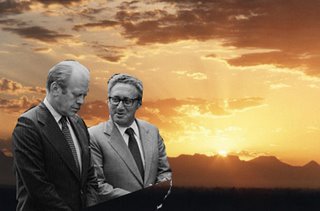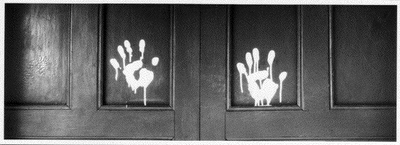
Yesterday morning,
Jackie Northam took on the task of "explaining" how US war policy in Iraq may change given the takeover of Congress by the Democrats. Northam,
yet again talking to think tank "experts," asserted that "there’s not much appetite in Congress for inserting more US troops into Iraq to help stabilize the country." Later, of Iraqi Prime Minister al-Maliki she stated that he "is not widely viewed as a robust, hands-on type of leader."
These are problematic assertions. Her first statement is based on the assumption that US military troops are a stabilizing factor (or that a lot more of them would be). One could just as easily argue that not just the presence, but the behavior of the US military, has promoted violence and chaos in Iraq and that more troops would simply kill a lot more people. Her second bit about al-Maliki is truly bizarre--robust? hands-on? Sounds like a description of Sadaam. And, frankly is what does it mean to be "hands-on" when one is holed-up inside the Green Zone?
It's not surprising that Northam would make such off the mark conclusions. Consider one of the "experts" she relied on for much of her report,
Max Boot of the Council on Foreign Relations. Here are some of his greatest hits:
October 31, 2002: "The Islamist militants - who are increasingly allied with Saddam Hussein's secular regime in battling against their common enemies in the west - may have reserved their deadliest blow for the US."
December 9, 2002: "Of the many silly reasons propounded for leaving Saddam Hussein on his blood-stained throne, the silliest has to be the suggestion that to remove him would promote 'instability.' "
February 11, 2003: "Secretary of State Colin Powell made a powerful, indeed incontrovertible, case at the United Nations on Wednesday that Saddam Hussein is sabotaging the UN weapons inspection process."
May 13, 2003: "But, on the whole, U.S. imperialism has been the greatest force for good in the world during the past century."
June 5, 2003: "Opponents of the war in Iraq must be chagrined to see pretty much all of their arguments discredited by events. Not able to forgive George W. Bush and Tony Blair for being right...."
September 7, 2003: "as in Vietnam, U.S. troops in Iraq are slowly winning the war on the ground, even as they're losing the public relations battle back home" (after spending 10 days in Iraq with the US military).
September 29, 2003: "Despite the missteps, the U.S. occupation is making rapid progress. During a recent tour of Iraq, I saw substantial normality in most areas. Markets are full of food, streets full of pedestrians and roads full of cars."
Don't expect the Boot to get booted from NPR anytime soon. In spite of being completely wrong about Iraq each step of the way he will probably be back on NPR to weigh in on Iran.
Here is the cold-blooded advice he offered readers of the LA Times last month on that crisis: "we need to think about a tougher approach to regime change...we need to consider the possibility of going beyond peaceful measures to foment change. An American invasion is out of the question. But perhaps we could do to Iran what the Iranians are doing to us in Iraq, where they are funneling weapons and money to militias that are killing our soldiers." He specifically wants to encourage sectarian and ethnic war in Iran--"The rest of the country is made up of ethnic minorities, many of them quite restive.... all have active separatist movements that have carried out anti-regime bombings...."
I'll close by letting "Mad Max" be hoisted by his own petard. Back in
February 27, 2003, lambasting anti-war protesters (then and throughout history) for causing more carnage and bloodshed than decisive military men, he declared:
- "It is perhaps too much to expect self-doubt from any political activist, right or left. But given the dismal record of antiwar demonstrations, today's marchers should heed Oliver Cromwell's advice to the Kirk of Scotland in 1650: 'I beseech you, in the bowels of Christ, think it possible you may be mistaken.' "
Amen!
 What is an informed, humane listener supposed to think when a news interview begins with the following statement: "In a new book, two scholars say America's strategy, not just in those countries [Afghanistan and Iraq], but overall has failed because it's based on idealism and moral imperatives?"
What is an informed, humane listener supposed to think when a news interview begins with the following statement: "In a new book, two scholars say America's strategy, not just in those countries [Afghanistan and Iraq], but overall has failed because it's based on idealism and moral imperatives?"


































